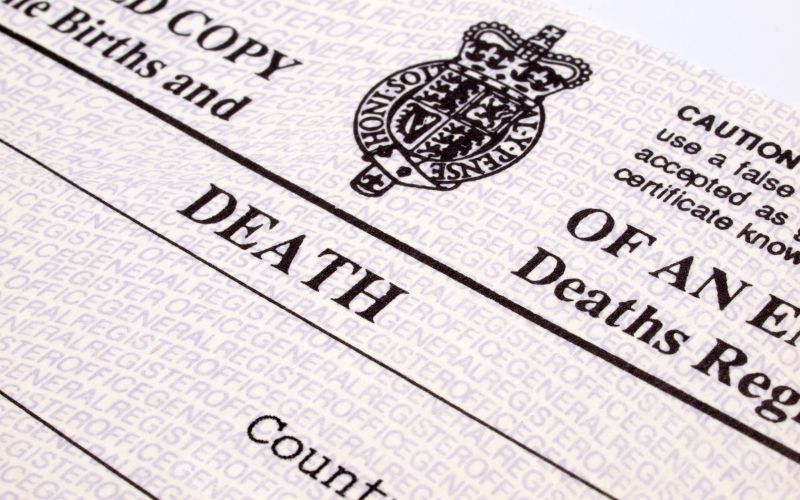Estate planning is essential for preparing and managing your assets during your lifetime and ensuring a smooth transition after your passing. One vital aspect of estate planning often overlooked is the role of death certificates in settling legal matters, closing accounts, and executing wills.
In this blog post, we’ll explore the importance of death certificates in estate planning and guide on obtaining these crucial documents. By understanding the significance of death certificates in end-of-life preparation, you can better equip yourself or a loved one to handle life’s final chapter with grace and confidence.
Understanding The Importance Of Death Certificates In Estate Planning
A death certificate is a vital government document that officially certifies the passing of an individual, providing critical information such as the date, time, location, and cause of death.
This important record serves numerous legal purposes in estate planning, from settling financial affairs to establishing beneficiary inheritance rights. For example, having a certified copy of a loved one’s death certificate may be necessary when claiming life insurance benefits or transferring asset ownership.
Additionally, institutions like banks and probate courts typically require proof of death before they can assist with managing the deceased person’s estate.
Legal Requirements And Benefits
To manage the estate of a deceased person, certain legal requirements must be met, including obtaining an official death certificate. A certified copy of the death certificate is usually required to settle a decedent’s accounts with financial entities such as banks, insurance companies, and government organizations.
Aside from meeting legal requirements, there are also several benefits to having an official death certificate. It provides essential information about the cause and date of death that may be needed for inheritance and beneficiary purposes.
Additionally, it serves as valuable documentation for settling debts and releasing assets during estate administration.
Obtaining And Using Death Certificates In Estate Planning
Who Can Request A Death Certificate?
Typically, immediate family members or legal representatives are authorized to request a death certificate. This includes the deceased person’s spouses, children, parents, grandparents, and siblings.
Additionally, executors named in a will or an estate planning document can also request a death certificate as part of their responsibilities in managing the decedent’s affairs.
It’s worth noting that some states may require additional documentation, such as proof of relationship or identity, before issuing a death certificate.
How To Obtain A Death Certificate
Obtaining a death certificate is an important step in estate planning and settling the affairs of a deceased person. Here are some steps to follow to obtain a death certificate:
1. Contact the vital records office in the county or state where the death occurred.
2. Request a certified copy of the death certificate to provide an official cause of death.
3. Provide necessary information about the deceased, such as their full name, date of birth, social security number, and the date and place of death.
4. Pay any required fees for obtaining the certified copy of the death certificate.
5. Wait for processing time, as receiving a copy of the certified death certificate from the vital records office can take several weeks.
It’s important to obtain multiple copies of the certified death certificate as financial institutions, government organizations, and insurance companies may require official proof of death during estate proceedings. Keep these copies in a safe place and provide them only to authorized parties who need them for legal matters related to settling the estate.
Common Issues And Best Practices
When it comes to obtaining and using death certificates in estate planning, there are a few common issues and best practices to keep in mind. One issue is ensuring that the cause of death listed on the certificate is accurate and matches any other legal documents related to the deceased’s estate.
Another best practice is keeping multiple copies of the certified death certificate on hand, as many financial entities and insurance companies require an original copy for claim processing.
Overall, by taking care when obtaining and using death certificates in estate planning, individuals can ensure a smoother and more efficient process for settling their loved one’s affairs after they pass away.
Common uses of death certificates in estate planning include:
- Claiming benefits and settling legal matters.
- Closing out accounts and releasing assets.
- Probating a will and settling debts.
Claiming Benefits And Settling Legal Matters
After a loved one passes away, benefits and legal matters need to be addressed. Here are some common uses of death certificates in estate planning:
1. Claiming Benefits – Death certificates may be required to obtain benefits such as Social Security survivor’s benefits, life insurance payouts, and retirement plan distributions.
2. Settling Legal Matters – Death certificates serve as proof of death in legal proceedings such as probate, where the decedent’s assets are distributed according to their will or state law. The executor of the estate will need a certified copy of the death certificate to initiate probate proceedings.
3. Closing out Accounts and Releasing Assets – Financial entities like banks, credit card companies, and investment firms require a certified copy of the death certificate before they release assets to beneficiaries.
4. Probating a Will and Settling Debts – The probate process involves validating the deceased person’s will, paying off debts and taxes owed by the estate, and distributing assets to beneficiaries according to their wishes.
Remember that different states may have varying requirements for obtaining death certificates or initiating probate proceedings. Be sure to consult with an attorney or financial advisor specializing in estate planning for guidance specific to your situation.
Closing Out Accounts And Releasing Assets
Once the death certificate has been obtained, it can be used to close out accounts and release assets. Here are some of the steps involved in this process:
1. Notify financial entities: The executor or personal representative should notify banks, credit unions, investment firms, and insurance companies about the decedent’s passing.
2. Provide a certified copy of the death certificate: Financial institutions typically require a certified copy of the death certificate to release funds or close accounts.
3. Liquidate assets: If the decedent had investments or real estate, these assets might need to be sold or transferred to beneficiaries.
4. Settle debts: The executor should use funds from the estate to pay off any outstanding debts or bills owed by the decedent.
5. Distribute remaining assets: Once all debts have been settled and assets liquidated, any remaining funds can be distributed to beneficiaries according to the terms of the will or trust.
Overall, obtaining a death certificate is essential in closing out accounts and releasing assets during estate settlement proceedings.
Probating A Will And Settling Debts
Probating a will and settling debts are important parts of the estate planning process that require the use of death certificates. When an individual passes away, their executor must file their will with the probate court to begin the legal process of distributing assets to beneficiaries and settling debts.
In some cases, outstanding debts or liabilities may be associated with the deceased person’s estate that needs to be settled before assets can be distributed among beneficiaries.
Death certificates help creditors verify a person’s passing so they can file claims against their estate for repayment.
Conclusion
Death certificates are crucial in estate planning and settlement. They provide proof of an official death and contain important information required for probate proceedings, inheritance matters, and asset management.
It is essential to obtain certified copies of the death certificate from the vital records office as soon as possible to avoid delays in settling the deceased’s affairs. Additionally, it is advisable to keep copies of the death certificate with other important estate documents such as wills, trusts, and insurance policies.


